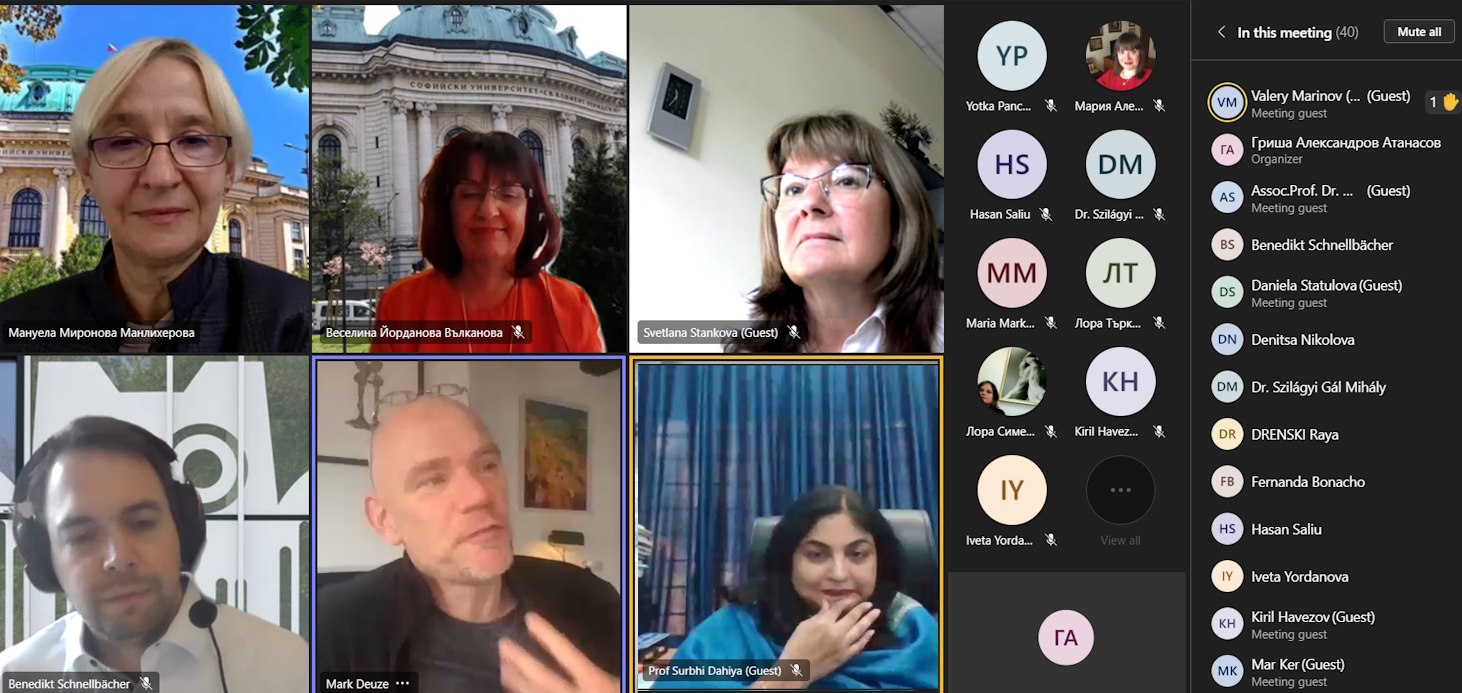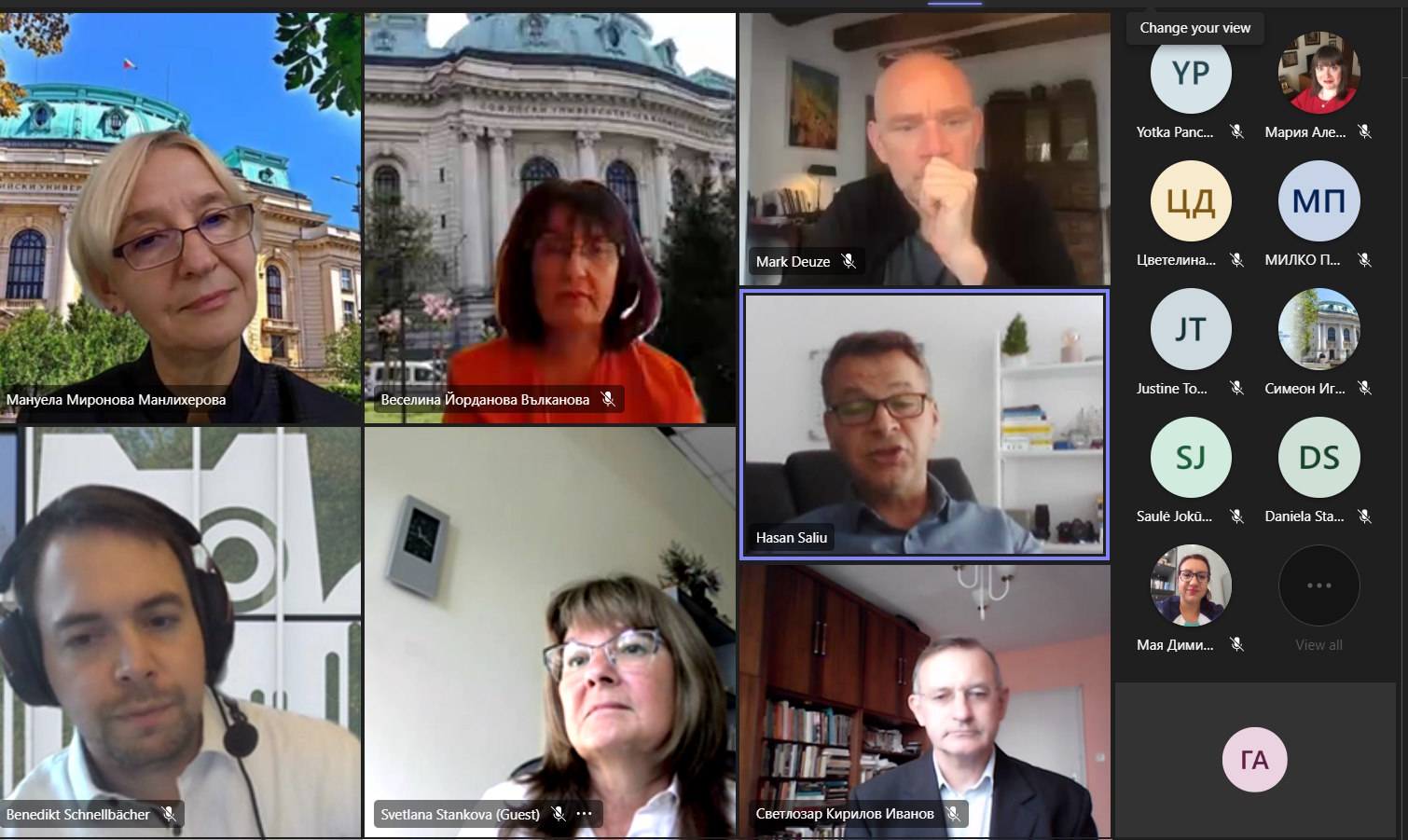The International Scientific Conference "Media and Communication: Transformations and Development in the Digital Age" started at FJMC
The International Scientific Conference "Media and Communication: Transformations and Development in the Digital Age" started at FJMC
For the fourth consecutive year the Faculty of Journalism and Mass Communication organizes the International Scientific Conference "Communication and Media of the XXI Century". This year, the forum is taking place on 26 and 27 October 2023 online on the Microsoft Teams platform. The theme of the 2023 conference is "Media and Communication: Transformations and Development in the Digital Age".

The event is part of two great anniversaries of the academic community of Sofia University - 135 years since the founding of Sofia University "St. Kliment Ohridski" and 50 years since the establishment of the Faculty of Journalism and Mass Communication.
Academic partners of the International Conference are prestigious foreign universities.
93 representatives of the global academic and institutional community - 16 participants from abroad and 77 from Bulgaria - will take part over two days.
The plenary session started at 10:00 a.m. (Bulgarian time) with the opening of the conference by Prof. Dr. Veselina Valkanova, Dean of FJMC. Prof. Valkanova congratulated the participants and expressed her satisfaction with the participation of leading researchers, scholars, teachers and practitioners in the field of media and communication, as well as with the impressive scientific programme of the conference on key topics of the development of media, communication and journalism education in the 21st century.
Prof. Dr. Valkanova stressed that at the beginning of the 21st century, educational institutions and especially universities are facing a number of social challenges, undergoing structural and educational transformations related to radical changes in the environment and the need for significant transformations of educational processes, academic programs and teaching approaches, also related to the need for digitalization.
In his speech prof. Vesselina Valkanova briefly outlined the main characteristics of the Bulgarian media environment, which has undergone dynamic and complex transformation processes over the last two decades. The processes are related to digitalization and the change in the business models of the media, as well as to the drastically different social, cultural, professional context of communications on a global scale. In periods of transformation and crisis, journalism and the media as public institutions find themselves in various risky situations that threaten freedom of expression, professional standards and ultimately pluralism and democracy. At the same time, the media industry is evolving in an environment of uncertainty, with adverse economic indicators - rising costs and shrinking household incomes - and global issues such as news avoidance and news fatigue, as well as the risk that economic weakness will make news organisations even more dependent on state advertising, leading to turbulence and profound disruptions affecting the media and their functioning.
At the end of his speech, Prof. Valkanova welcomed the participants to the Plenary Session and introduced the four leading researchers who took part in it.

The session itself was moderated by Assoc. Prof. Dr. Manuela Manliherova. The beginning of the discussion was given by Prof. Dr. Mark Deuze from the University of Amsterdam, the Netherlands, a leading researcher in the field of journalism and media culture. Prof. Deuze presented a paper titled "The Glitch, Uncanny, and Dizziness of Freedom: Articulating (a Future for) Media Studies," in which he shared with the audience his view that the contemporary context of living in, rather than with, the media offers the challenge of finding ways to study the media effectively. While scholars working in any other field tend to see media as something that happens in people's lives, media studies sees how people create worlds in and through media.
The floor was then given to Prof. Dr. Benedikt Schnellbecher from the University of Saarland, Germany, an expert in the development of digital business models. In his report prof. Schnellbecher focused on the power of digital technologies and their impact on society.
The topic of transformation of media journalism and corporate journalism was addressed by Prof. Dr. Surbhi Dahiya of the Indian Institute of Mass Communication, New Delhi, a former journalist with The Tribune newspaper and current researcher on English-language journalism in India.
The plenary session concluded with a paper by Prof. Dr. Hasan Saliu from AAV College, Pristina, Kosovo - former Dean (2011-2016) of AAV College, researcher in the field of public diplomacy, media literacy and public relations. It was national television and digital journalism that stood at the center of Prof. Saliu.
The conference will continue in 10 parallel panels.
In the working panels, lecturers and researchers from Bulgarian universities and institutions - Sofia University's Faculty of Journalism, Sofia University's Faculty of Arts, NBU, VTU, South West University, American University in Blagoevgrad, Varna Free University - will discuss a wide range of issues with their colleagues from foreign universities from 15 countries: Eastern Kentucky University, USA, University of Vilnius, Lithuania, University of Saarland, Germany, University of Trieste, Italy, University of Turin, Italy, Polytechnic Institute of Lisbon, Portugal, University of Alicante, Spain, AAV College in Pristina, Kosovo, the University of Amsterdam in the Netherlands, Korea University in the Republic of Korea, the Indian Institute of Mass Communication in New Delhi, Eotvos Lorand University in Hungary, Silesian University in Poland, Kharkiv National University of Economics in Ukraine.
The conference papers will be published in a peer-reviewed collection.
Site
